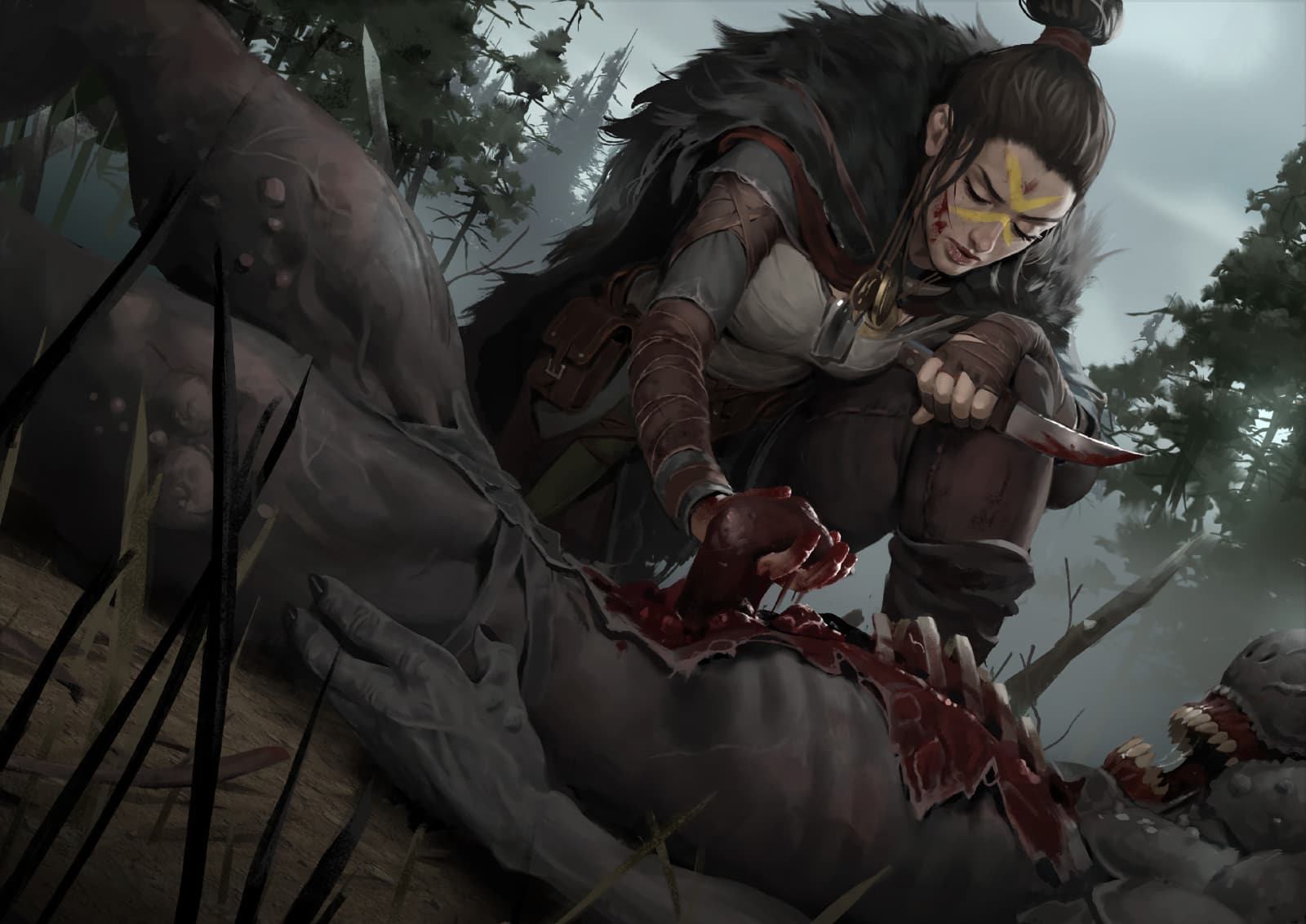
A brief intro to the post-post-apocalypse world of the Degenesis tabletop RPG
Degenesis is a tabletop roleplaying game published by Sixmorevodka, a Berlin-based concept art studio. It’s what I refer to as a Setting First game, meaning that the game’s setting has a depth equal to or exceeding those found in works like The Lord of the Rings, Dune, or A Song of Ice and Fire. The mechanics exist to facilitate adventure in the game world, and really digging into the setting is a huge part of the game’s appeal for its fans.
That setting is both deep and broad, spanning Europe and much of Africa, with a metaplot that starts a few decades from now and reaches five centuries into the future. In 2073 an asteroid strike obliterates human civilization – an event known as Eschaton. As humanity’s remnants begins to rebuild, it becomes clear that the asteroids brought something with them that rewires DNA. It warps biology, creating bizarre vegetation in Africa and weird new animal species in Europe. Most terrifying, it can hijack humans, turning them into Psychonauts. These creatures follow the programming written into their genetic code by the alien substance known as the Primer.
Across Africa and Europe clans and cults plot and scheme, all driven by their own needs. Some find common purpose, some are continuously at odds with each other, and they each see the threat of the Primer through a different lens. In other words, humanity is just as confused and conflicted in the face of this existential threat as it has been from the beginning. Indeed, grudges nurtured over hundreds of years, products of actions taken in the Bygone era, are still playing out. Godlike Marauders pull strings and manipulate events. Sleepers lie in stasis, waiting for the moment they will be unleashed to fulfill their memetic conditioning. This isn’t a world of good and evil; it’s a world of layered secrets and hidden dangers.
Now let me interrupt this post for a teaser video that will demonstrate just how committed the game’s creators are to their work:
A World in Motion
Unraveling the mysteries of the metaplot is part of the fun of Degenesis. It’s fair to say many of the game’s adherents spend as much time re-reading the books for clues and sharing hypotheses in the Degenesis Discord as playing the game. That said, there’s plenty to do in Degenesis. The campaign I’m running has now been going for 48 sessions, and we’re not even remotely close to tapping out the possibilities for the characters or their ongoing story. And I can think of a half dozen campaigns I’d like to run, each quite different from the others.
Degenesis has been described as a post-post-apocalyptic game, and that’s a useful way of distinguishing it from many other games. Eschaton created a new world – it reordered the landscape, changed climate patterns, and created new forms of life. Over generations humanity came together in clans, broad cultures, and narrow cults. New cities rose, wars were fought, and ideologies unknown to the Bygones took hold. So the world of Degenesis isn’t just people driving big rigs around in the desert, or loners digging in the ruins for long-lost technology (though neither of those situations are foreign to Degenesis). It’s people doing their best to survive, prosper, and follow their beliefs.
Player character groups can be composed of members of the same clan or cult, but are usually a mix of characters brought together for one reason or another to accomplish something important. How those characters come together even though they may be members of clans or cults with differing goals can drive a lot of really engaging roleplaying. I’ll use my player character group as an example.
The Sons of Lucatore
Roch, Armani, and Lukas grew up together in the town of Lucatore, nestled in the foothills of the Dolomite Alps in Northern Purgare. In time each left the town to seek their own path.
Ever-vigilant Roch followed in his mother’s footsteps and became a Hellvetic soldier. The Hellvetics are a mercenary cult that controls vital routes through the Alps and across the deadly Reaper’s Blow. They also hire out on dangerous missions all over the known world.
The clever and bookish Armani was recruited into the Spitalian order. A militaristic cult of doctor-scientists who fight the Primer wherever they find it, the Spitalians are single-minded and at often ruthless in pursuit of their aims.
In a most unlikely turn, the big and gregarious Lukas became a Judge. This cult enforces the rule of law through swift, direct action. They create, adjudicate, and apply their mandates, and they see themselves as the sole protectors of civilization, the last line of defense from barbarism.
One evening the three were reunited after years apart through sheer chance in a small village near Lucatore. Lukas was on the trail of an escaped felon. Roch and his comrade-in-arms were attempting to find the source of a strange radio signal that could indicate the presence of smugglers in Hellvetic territory, and Armani was accompanying his mentor to Lucatore to conduct a routine medical examination of that town’s ruler.
Through a series of events they found themselves heading to their childhood home of Lucatore, pursuing an Apocalyptic who had been smuggling Burn (a very dangerous Primer-spawned drug) through Hellvetic territory. From there the events of the published adventure In Thy Blood played out, and the Sons became enmeshed in a series of events that led them to serve as escorts for a powerful Neolybian merchant and his retinue as he hunted for Psychnoauts and set up trade deals. That took them eventually to the city of Toulon in southern Franka, After venturing into the swamps of Franka to find Bygone relics and running afoul of the local Scrappers who specialize in such activity, they took part in events of The Killing Game, the second big published adventure.
They once again went into the deadly Frankan swamps, and are now making their way east into the mountains, with the goal of making their way to Justitian, the biggest and most powerful city in Europe. Lukas has to attempt to clear his name or die trying.
There’s Always More
There are six cultures, twelve cults, numerous clans (and custom clans can be created), so the possible intersections of geography, politics, and personal character motivations is vast. You could run a campaign set wholly in Justitian, in which each of the PCs starts as a street kid and they all become part of the same Apocalyptic flock, running illegal schemes and living every moment like it’s their last. Or you could build a campaign around the efforts of a Neolybian merchant to subdue an unruly portion of Hybrispania with the help of Scourger warriors, in order to make a huge profit from hidden mineral reserves. Chroniclers are always seeking more information, more Bygone technology. A campaign centered on a small team of Chroniclers and Scrappers who will go to any lengths to find and retrieve such treasures could be a lot of fun. I could go on and on – the world is just overflowing with possibilities.
This is just a brief intro, but if you want to know more about the mechanics of Degenesis and how it plays, please check out these Unpossible Journeys posts:
Also check out this video:
If you’re not already intrigued, here’s another video from Sixmorevodka:
Finally, check out Degenesis.com, which blows any other tabletop RPG’s website out of the water. It’s just crammed with short stories, the astounding art and maps the game is known for, a metaplot timeline, a dynamic world map, and more. And you can download all of the Degenesis books in PDF form for free.
Ω

